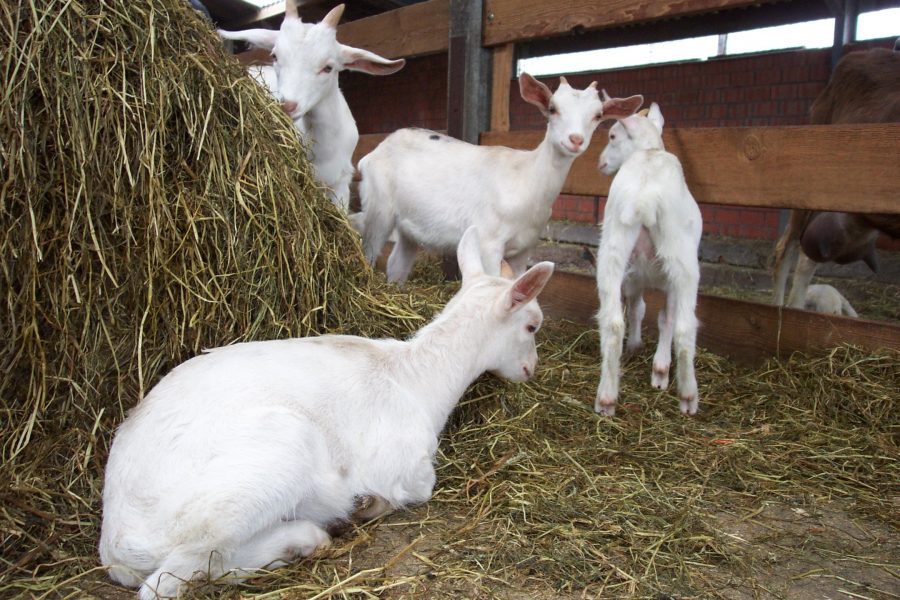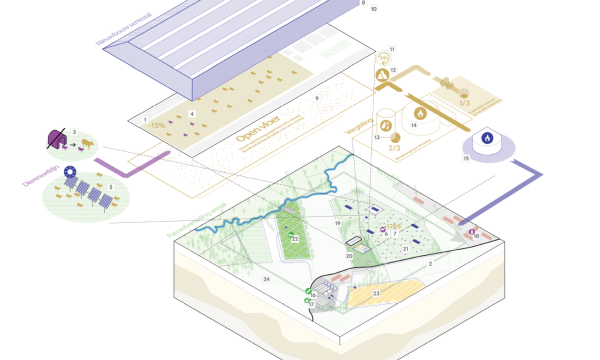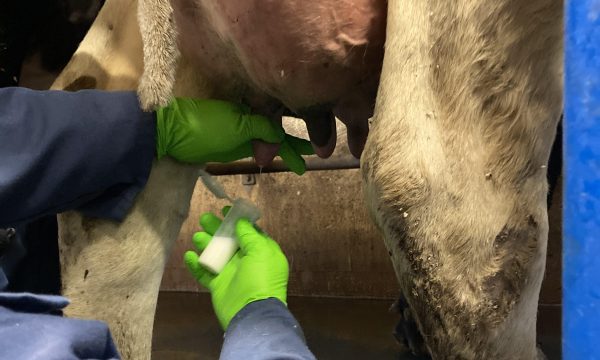Project news Teaching young ruminants new tricks: adjusting methane emissions before birth or shortly after?

Because the methane production of adult ruminants mainly takes place in the rumen, an adjustment there could reduce the emission of the greenhouse gas methane. Sieglinde Debruyne (ILVO, UGent) investigated in her PhD whether feed supplements in young ruminants could influence their later methane emission or production. The tested feed supplements did not deliver the expected reduction of methane emissions, but other effects were measured in the studied cattle and goats.
Influence of fatty acids on methane production
Methane production in the rumen of adult ruminants can be reduced by adding fats to the ration. This is an effective and readily applicable method. Fatty acids have a toxic effect on certain rumen microbes, reducing methane production. However, fats in the ration can also lead to reduced digestibility and feed intake. This is obviously an undesirable side effect that can adversely affect production. Therefore, the targeted adjustment of rumen flora in calves could be a big step forward. After all, the required amount of methane-reducing supplement is lower in calves and especially the negative side effects on production remain limited. This was the starting point of Debruyne's doctoral research.
Heifer calves
A first part of the study was conducted on Holstein heifer calves. These received extruded flaxseed or a mixture of essential oils added to the ration twice daily until they were 4 months old. Individual methane emissions from the cattle were measured at 4, 6, 12 and 18 months of age and methane emissions were also monitored in the dairy barn 3 weeks before to 5 weeks after their first calving. Weight and feed intake of all cattle were recorded regularly throughout the study period, as was daily milk production up to 5 weeks into lactation.
The results of the study were clear: the administered supplements did not appear to affect the numbers of the most important rumen microbes or the methane emissions of the cattle. Not only during the treatment in the first 4 months, but also as their life continued, no noticeable difference in methane emission could be observed. Nevertheless, the study revealed some surprising things. Calves fed extruded flaxseed or essential oils had better feed conversion and grew faster during the treatment period and also during the rest of the first year of life. As a result, these calves were heavier and could be inseminated a month earlier. However, due to the large variation in fertility results across the study, the associated lower calving age was not significantly different. The use of these supplements in the first stage of life resulted in better feed and energy efficiency in the first weeks of lactation almost two years later, after the first calving!
Young bucks
The second part of the study was conducted in goats. The frequent occurrence of twins or even triplets makes goats interesting animals for experiments of this type. After all, a treatment during the pregnancy of 1 mother can be followed after birth by different treatments in the twin kids. This provides a better basis for comparison with a smaller influence of environmental variables, making the research results clearer.
Hoeve 't Leenhof in Zele provided the kids for this trial. A group of pregnant mother goats received a supplement based on coconut oil during the last three weeks of pregnancy. Kids born from this treated group and from a control group without supplement were then also given this supplement or not. In this way, the impact of the coconut oil fatty acids, administered before and/or after birth, could be determined.
Administration of the coconut oil fatty acids both during gestation and during the first 4 weeks after lambing, did suppress the development of rumen microbes to a great extent. This resulted in a reduction of methane emission of 82% (in a lab simulation). However, once the treatment was stopped at 11 weeks, methane emissions returned to normal levels.
However, the coconut oil fatty acids disrupted the normal milk intake and rumen function in early life. The lambs receiving the coconut oil fatty acids took in less milk formula, resulting in a growth deficit that was still present after 28 weeks. Bacterial function of the rumen normalized by the end of postnatal treatment. Nevertheless, 4 months later, differences in the density, length and width of rumen papillae were noticeable at different locations in the rumen. However, the absorption area of the papillae was not different between the groups.
Conclusion
The tested feed supplements did not deliver the expected reduction in methane emissions. Adding them before birth in goats led to temporary or long-term effects on rumen (microbial) development and growth of the animal. In addition, addition after birth in heifer calves was found to have positive effects on daily growth in early life and feed efficiency until after the first calving. Further research in dairy cows, meanwhile, focuses on directing rumen function at an early age to achieve more productive cows and higher feed efficiency.
Project title: Inzicht verwerven in de ontwikkeling en stabiliteit van het pensmicrobioom als een basis voor nieuwe methaanreducerende maatregelen. (Gaining insight into the development and stability of the rumen microbiome as a basis for new methane-reducing measures.)
Term: 2014-2018
Funding: Eu Facce – JPI, AVEVE, AGOLIN, VLAIO
Partner: UGent


